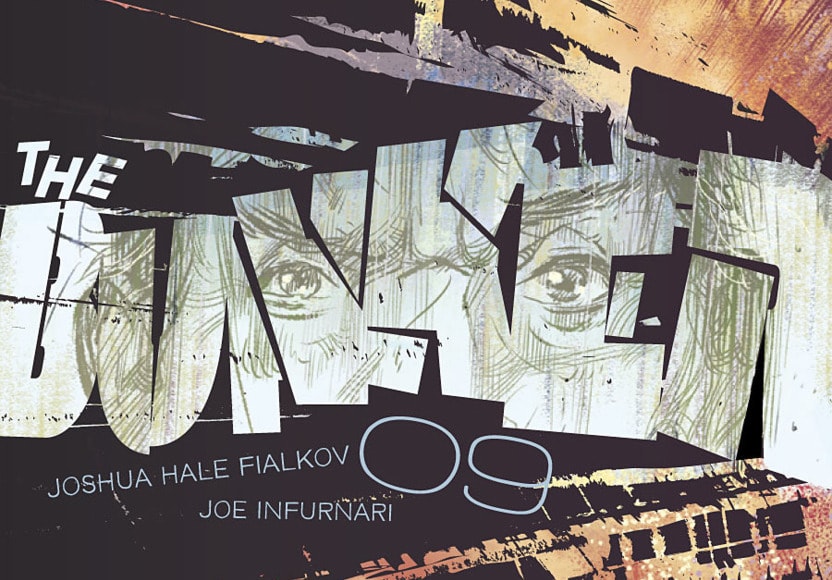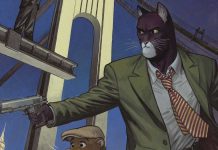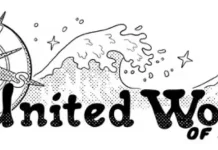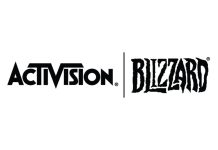As long as he wrote them, Josh Fialkov was one of the most interesting voices in comics. He created books as creative and varied as a noir about a detective with brain cancer to a purgatory-set adventure co-starring Ernest Hemingway. Sadly, comics lost him to television and film, at least for now. I was really glad Josh found the time to chat to me about what brought him to Hollywood, what he loves about writing for the screen, why he thinks the comics industry would benefit from a union. Check out our fun and informative discussion below.

How did you find work in TV?
For years and years, I’d optioned the creator-owned work I’d co-created to various producers and studios. Uniformly, I’d watch them hire neophyte screenwriters or tv writers, and then they’d do these bizarro riffs on the concepts of the books, usually stripping out a lot of what, to me, was the soul of the story.
This was, of course, super irritating. First, off, why buy the rights to something that you are going to throw most of in the trash. Secondly, by removing the heart and soul of the books, they were uniformly making sure that the stories didn’t work properly. And Finally, I was leaving the book’s destiny in the hands of strangers. Strangers who were going to make all of the decisions and all of the money.
This never really sat well with me, and while I’d always fought to adapt my own work, there came a time, right after I was shown the door at DC Comics, that I realized that I needed to bet on myself and my co-creators. I put my foot down and said I’m not selling any more of my books to Hollywood unless I’m writing them.
The first beneficiary of that was THE BUNKER. Joe Infurnari and I sold it to Lionsgate with Sam Raimi and Rob Tappert attached to produce. While it didn’t get picked up, because I was adapting it, and Joe was seeing every script draft, we got to at least make sure the product was something we were both happy with.
That job was so much more gratifying than I expected it to be, and that script was liked a lot more than I realized, and I started getting offers to move over to TV.
Although, my very first staffing job is about as atypical a story as humanly possible…
My absolute favorite show of all time is St. Elsewhere. (It’s all on Hulu, go watch it. Right now.) So, when I had to write a spec script (a sample used as a calling card to get work) I wrote my own medical drama in the vein of St. Elsewhere.
So, in 2015, I think, Chicago Med from Dick Wolf had just been picked up, but, got the pick up later than expected. So that meant there were fewer writers than normally available. Plus, it was really uncool to write a network-y medical pilot. Plus, that show was going to feature Oliver Platt as a grumpy, ruffled Psychiatrist. Well, I was available, had a medical pilot, AND my dad was a grumpy, ruffled Psychiatrist. The basic alchemy that got me through that door right then was miraculous.
Dick Wolf is one of the biggest, most enduring names in the history of television. Did you learn a lot working on his show?
Probably my favorite thing about TV is that it’s structured like an apprenticeship. The entirety of the structure is to take you from being a so-called Baby Writer to being a Showrunner. So, every job, good, bad, or ugly, ends up teaching you a ton. And certainly all jobs do that, but, in TV, because you’re moving up the ladder, you get to experience things from different vantage points and with ever-changing skills and abilities to deal with those lessons.
That clear career, progressive career growth certainly doesn’t exist in comics. Is a big appeal of working in television the reliability of the profession compared to other creative industries?
Yes and no. Having a contract with union protections is simply amazing after more than a decade of freelancing issue to issue in comics. But, for the most part, as the tv industry’s changes because of streaming and the dominance of short order shows, you can find yourself unemployed four to six months a year. I wrapped on my last show in December and the third episode only aired last night. So there’s no decision about a season two for a while yet.
BUT—
The WGA in our last negotiation worked out a deal where, based on a writers salary the studios can only hold a writer exclusively in first position for 90 days, without resuming payment. So that means I could get a job three months after I was wrapped. Compare that to just about any other situation and again, damn it’s great to have a union.

Do you think the comics needs a union akin to the WGA?
I do. I’m pretty active in the union, and I’ve encouraged everyone I can that we need to have at least a caucus for comic book creators. When you look at how much the talent in comics has done and how little they’ve received in return it’s… shocking. While there’s still a wide gap in those numbers in the world of the Guild, nowhere near as wide as in comics. And we get health insurance, pension, and so on.
There’s been an increased push for unionization in video games but I haven’t heard about a union for comic book creators. Do you think the dominance of the Big Two makes a comics union more challenging?
It’s a couple of things. The day to day labor of comics doesn’t pay great. While you certainly have your top tear talent making great money, the middle-class and below writer of comics just aren’t earning enough to qualify for the insurance thresholds for most unions.
Beyond that, it takes a unified will to unionize, and comic creators are so all over the mat.
A few years ago I posted a thread on Twitter about the difference financially between working in tv and working in comics, and how much better the life is in TV, financially and holistically. I was then broadly attacked by a bunch of comics pros who called me a ‘wuss’ or a ‘baby’ for pointing out that our employers make a bloody fortune on us and then throw us out when they’re done using us up.
The irony was a lot of the pros were older creators who’d had exactly that done to them.
It’s been bred into creators that we have to be our own protection, and, to some degree, that’s true of all artists, freelancers, and people. But, the point of a union is not to help the most successful. It’s to protect the least successful. In comic books, there’s every chance that the neophyte will be the all-star within a matter of years (or, hell, I’ve seen it happen in months.)
Do you miss, if not the economic side, the creative side of comics? There’s a degree of control, particularly with creator-owned work, that’s hard to match in TV production.
I do, absolutely. I even miss the corporate comics. There’s an intimacy in the medium between the creator and the reader that is unmatched in any other medium. You’re telling a story with your reader. Even in prose, your reader is imagining the story, but, you’re doing all of the foundational work.
In comics, you’re actually getting a chance to incorporate them into the process.
At the same time, I imagine it’s exciting to be playing an important role in such a huge enterprise that is a network TV show with a huge team, a large budget, etc.
TV is actually very surreal. For the most part, you’re actually producing very close to when the thing ends up airing, and it’s, essentially, a multi-million dollar movie. And it goes from idea to script to airing in a month or two at most. That’s the part that’s most like comics.
I have a background in TV and film production, so I’d done a lot of the physical side of making things, but, the more I get to actually make things I’ve written the more I fall in love with it.
The thing is, like comics, the actual act of having work with your name on it come out never gets old. It’s a thing that you killed yourself working on, and good, bad, or otherwise, it’s representative of a period of time in your life where you did damn near everything you could to get it done.
I wrote a spec for a procedural TV series years ago and really enjoyed writing towards the act breaks and playing within that structure. Is there something uniquely satisfying for you about writing a TV series with a formula?
It’s not that different than comics, actually. In fact, in some ways, it’s easier. The ends of issues of comics, at least in modern comics, are essentially the equivalent of a TV shows Act Breaks. With one difference. Those are act breaks that need to make someone come back in a month, rather than in three minutes.
Comics is an amazing training ground for serialized storytelling of all kind. You’re constantly structuring to keep readers on a roller coaster ride.
And the shift in the length of story arcs forced you to adjust to a different structure, which I imagine helped as well.
Sure. I’m also just built for serialized storytelling. When I was a little kid, my nightmares were serialized. So I’d wake up on a horrifying cliffhanger, then, the next night, I’d go to sleep and pick up from where I left off.
It’s in my blood.
Do you have an outlet for your original work right now?
Oni Press remains my home, I just haven’t really been working on anything. I’ve gone from show to show pretty solidly the past five years now.
But, I’ve finally had a decent enough hiatus that I finished a few new scripts, a feature, a pilot, and, hopefully, a new comic project.
Having a kid has become the place for my joy, honestly. So, I spend as much time with her as I can, but, she’s getting older and has enough activities that I’m not involved in that I’m starting to take time for myself again.
Check out Josh Fialkov’s early and latest works and follow him on Twitter @JoshFialkov.
Matt Chats is an interview series featuring discussions with a creator or player in comics, diving deep into industry, process, and creative topics. Find its author, Matt O’Keefe, on Twitter and Tumblr. Email him with questions, comments, complaints, or whatever else is on your mind at [email protected].










